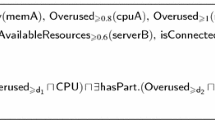Abstract
The majority of existing information systems deals with crisp data through crisp database systems. Traditional Database Management Systems (DBMS) have not taken into account imprecision so one can say there is some sort of lack of flexibility. The reason is that queries retrieve only elements which precisely match to the given Boolean query. That is, an element belongs to the result if the query is true for this element; otherwise, no answers are returned to the user. The aim of this paper is to present a cooperative approach to handling empty answers of fuzzy conjunctive queries by referring to the Formal Concept Analysis (FCA) theory and fuzzy logic. We present an architecture which combines FCA and databases. The processing of fuzzy queries allows detecting the minimal reasons of empty answers. We also use concept lattice in order to provide the user with the nearest answers in the case of a query failure.
Similar content being viewed by others
Explore related subjects
Discover the latest articles, news and stories from top researchers in related subjects.References
Gaasterl T, Godfrey P, Minker J. An overview of cooperative answering. Journal of Intelligent Information Systems, 1992, 1(2): 123–157.
Bosc P, HadjAli A, Pivert O. Towards a tolerance-based technique for cooperative answering of fuzzy queries against regular databases. In Proc. the 13th International Conference on Cooperative Information Systems (CoopIS), Agia Napa, Cyprus, Nov. 12–14, 2005, LNCS 3760, pp.256–273.
Stumme G, Wille R, Wille U. Conceptual knowledge discovery in databases using formal concept analysis methods. In Proc. the 2nd European Symposium on Principles of Data Mining and Knowledge Discovery (PKDD'98), Nantes, France, 1998, LNCS 1510, pp.450–458.
Ganter B, Wille R (eds.). Formal Concept Analysis. Mathematical Foundations, Springer Verlag, 1999.
Lotfi Zadeh. Fuzzy sets. Information and Control, 1965, 8(3): 338–353.
Wille R. Restructuring Lattice Theory: An Approach Based on Hierarchies of Concepts. Ordered Sets, Rival I (ed.), Dordrecht-Boston: Reidel, 1982, pp.445–470.
Karl Erich Wolff. Concepts in fuzzy scaling theory: Order and granularity. Fuzzy Sets Systems, 2002, 132(1): 63–75.
Andreasen T, Pivert O. On the weakening of fuzzy relational queries. In Proc. the 8th International Symposium on Methodologies for Intelligent Systems, London, UK, LNCS 869, Springer-Verlag, Oct. 16–19, 1994, pp.144–153.
Wanyinna Amenel Voglozin, Guillaume Raschia, Laurent Ughetto, Noureddine Mouaddib. Querying the SaintEtiQ summaries—Dealing with null answers. In Proc. the 14th IEEE International Conference on Fuzzy Systems (FUZZ-IEEE 05), Reno, Nevada, USA, May 2005, pp.585–590.
De Calmèes M, Dubois D, Hullermeier E, Prade H, Sedes F. Flexibility and fuzzy case-based evaluation in querying: An illustration in an experimental setting. International Journal of Uncertainty, Fuzziness and Knowledge-Based Systems, 2003, 11(1): 43–66.
Mohamed Ali Ben Hassine, Habib Ounelli. IDFQ: An interface for database flexible querying. In Proc. the 12th East-European Conference on Advances in Databases and Information Systems (ADBIS 2008), Pori, Finland, LNCS 5207, September 5–9, 2008, pp.112–126.
Mohamed Ali Ben Hassine, Amel Grissa, Habib Ounelli, José Galindo. How to Achieve Fuzzy Relational Databases Managing Fuzzy Data and Metadata. Handbook on Fuzzy Information Processing in Databases, Galindo J (ed.), Information Science Reference, 2008, volume 2, pp.348–372.
Godin R, Rokia M, Alaoui H. Incremental concept formation algorithms based on Galois (concept) lattices. Computational Intelligence, 1995, 11(2): 246–267.
Hanene Chettaoui, Mohamed Ali Ben Hassine, Narjes Hachani, Habib Ounelli. Using FCA to answer fuzzy queries in cooperative systems. In Proc. the 5th International Conference on Fuzzy Systems and Knowledge Discovery (FSKD), Jinan, Shandong, China, Aug. 25–27, 2008, pp.14–20.
Asuncion A, Newman D. UCI machine learning repository. Irvine, CA: University of California, School of Information and Computer Science, 2007, http://www.ics.uci.edu/~mlearn/MLRepository.html.
StatLib: Data, Software and News from the Statistics Community. http://lib.stat.cmu.edu.
Author information
Authors and Affiliations
Corresponding author
Electronic Supplementary Material
Below is the link to the electronic supplementary material.
Rights and permissions
About this article
Cite this article
Hachani, N., Ben Hassine, M.A., Chettaoui, H. et al. Cooperative Answering of Fuzzy Queries. J. Comput. Sci. Technol. 24, 675–686 (2009). https://doi.org/10.1007/s11390-009-9252-1
Received:
Revised:
Published:
Issue Date:
DOI: https://doi.org/10.1007/s11390-009-9252-1




